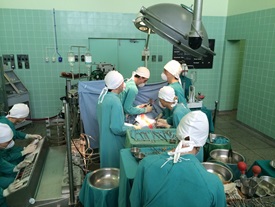By Kevin P. Daly, MD
I was fortunate enough to recently visit South Africa, a breathtakingly beautiful country full of contradictions. It is a place where beautiful wildlife lives just a few hours from burgeoning cities. A place where extreme oppression has given way to the “Rainbow Nation.” But it is far from perfect. South Africa is still struggling to deliver consistent medical care to its entire population and to deal with the epidemic of HIV and tuberculosis. It is also the place where the first heart transplant was performed in 1967 by Christian Bernard. Since that time, heart transplantation has evolved dramatically thanks to the dedication of patients, parents, physicians and scientists, working together to understand the issues key to improving patient survival and quality of life. 
Much of that improvement is due to the success of immunosuppressive medications such as cyclosporine, tacrolimus (Prograf), mycophenolate moefetil (CellCept), and sirolimus (Rapamune) in preventing acute rejection.
While the medications used to treat rejection have evolved, our ability to accurately diagnose rejection continues to rely on obtaining small pieces of heart tissue, called biopsies, to examine under a microscope. Similarly, our ability to diagnose post-transplant coronary artery disease relies on direct injection of dye into the coronaries with a catheter. While performing a heart biopsy and coronary angiography is safe, the procedure requires sedation and can cause anxiety in many of our patients and their families. There’s a clear need to develop non-invasive testing for rejection that is accurate, inexpensive and easily performed. AlloMAP is one of the first non-invasive tests available to diagnose rejection. However, it has its limitations: It’s only been validated in patients older than 15 years of age; it may not be reliable in the first 6 months after transplant when rejection rates are the highest; and it cannot identify all forms of rejection.
 There is a tremendous need to develop non-invasive ways to accurately identify rejection in all its forms (cellular, antibody and chronic coronary artery disease). The Transplant Research Program here at Boston Children’s is committed to researching and developing these non-invasive tests for rejection that are accurate in both adults and children. To date, we have identified a set of three proteins that can be used to monitor for chronic rejection in heart transplant recipients. New work has found that one of those proteins, called VEGF-A, appears to predict the development of severe forms of post-transplant coronary artery disease in children. We have examined the possibility of leveraging new imaging technology, such as PET or MRI, for the diagnosis of acute and chronic rejection. In addition, we continue to study the use of echocardiography and blood-based biomarkers to identify patients at low risk of rejection. While our efforts have started in heart transplant patients, we hope to validate and test markers in kidney, liver and lung transplant recipients in the near future.
There is a tremendous need to develop non-invasive ways to accurately identify rejection in all its forms (cellular, antibody and chronic coronary artery disease). The Transplant Research Program here at Boston Children’s is committed to researching and developing these non-invasive tests for rejection that are accurate in both adults and children. To date, we have identified a set of three proteins that can be used to monitor for chronic rejection in heart transplant recipients. New work has found that one of those proteins, called VEGF-A, appears to predict the development of severe forms of post-transplant coronary artery disease in children. We have examined the possibility of leveraging new imaging technology, such as PET or MRI, for the diagnosis of acute and chronic rejection. In addition, we continue to study the use of echocardiography and blood-based biomarkers to identify patients at low risk of rejection. While our efforts have started in heart transplant patients, we hope to validate and test markers in kidney, liver and lung transplant recipients in the near future.
Non-invasive testing for identifying rejection remains an elusive “holy grail” for those of us in the transplant community. We are committed to the development of better non-invasive testing in order to improve the quality of life and the quality of care we deliver to our patients. With your continued help and support, we will eliminate the contradiction that exists between modern transplant medicine and the continued use of rudimentary biopsies to diagnose rejection. I envision a not-so-distant future when modern, non-invasive tests can be as simple to perform as a blood sugar test with a machine that can be carried anywhere in the world. Wouldn’t it be wonderful to travel to Cape Town, visit the hospital where the first heart transplant was performed, run a quick rejection test and know that your patient’s heart will last for years to come?

Learn how you can help support efforts to improve the diagnosis of organ rejection by contacting Melanie Torosyan, Senior Major Gifts Officer at Boston Children’s Hospital Trust, 617-355-4102, Melanie.torosyan@chtrust.org
